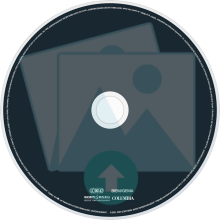
Cover NOT yet available in
Join up for 4K upload/download access
Your Rating (Click a star below)
![]()
![]()
![]()
![]()
![]()
![]()
![]()
![]()
![]()
![]()
Track List
01) (He'll Never Be An) Ol' Man River
02) All Homeboys are Dickheads
03) Garbage
04) Lose Your Delusion II
05) !UOY Sevol Natas
06) What Nationality is Les Murray?
07) Greg! The Stop Sign!!
08) Play Mistral for Me
09) How Do I Love Thee?
10) Jung Talent Time
11) Aussiemandias
12) Give Up for Australia
01) (He'll Never Be An) Ol' Man River
02) All Homeboys are Dickheads
03) Garbage
04) Lose Your Delusion II
05) !UOY Sevol Natas
06) What Nationality is Les Murray?
07) Greg! The Stop Sign!!
08) Play Mistral for Me
09) How Do I Love Thee?
10) Jung Talent Time
11) Aussiemandias
12) Give Up for Australia
2:24
3:08
3:31
3:35
3:36
4:36
3:28
3:44
5:17
4:40
4:16
5:52
Data Complete 40%
Total Rating
Total Rating
![]() (0 users)
(0 users)
Back Cover![]()
CD Art
3D Case
3D Thumb
3D Flat
3D Face
3D Spine
First Released
![]() 1995
1995
![]() Alternative Rock
Alternative Rock
![]() ---
---
![]() ---
---
![]() ---
---
![]() Medium
Medium
![]() Album
Album
![]() 0 copies
0 copies
Album Description
Available in:
Machiavelli and the Four Seasons is a 1995 album by the Australian rock group TISM (This Is Serious Mum). It is TISM's most famous release and the one with which they received the most critical success and fame. The album was certified Gold by the ARIA Awards and won the ARIA Award for Best Independent Release. The award was accepted in person by Les Murray, the subject of the song "What Nationality is Les Murray?"', who read a seemingly insulting acceptance speech in his native Hungarian. Three of its songs reached Triple J's Hottest 100, two of them in the top 10. This was also TISM's highest charting album, reaching number 8 in the Aria Charts.
The album featured TISM's switch from Alternative rock to synth-driven techno and dance music, which still retained the loud guitars and vocal melodies of their earlier music. The two singles Greg! The Stop Sign!! and (He'll Never Be An) Ol' Man River are two of TISM's most well known tracks.
The cover of the album is a picture of The Hollywood Argyles. The title is a composite phrase of doo wop group Frankie Valli and the Four Seasons and thinker Niccolò Machiavelli.
The unusual title stems from a conceit found throughout the cover, although not in the tracks themselves, that this is actually an album by a group called "Machiavelli and the Four Seasons". The liner notes include an essay on the band's music, written with gushing praise. Track titles are also given, entirely revolving around the words "I", "Love", "You" and "Baby". A hidden track at the end of the actual album, entitled "Phillip Glass's Arse", is a melodic, a cappella harmonised song that gives a representation of what Machiavelli and the Four Seasons might actually sound like. TISM used the name "Machiavelli and the Four Seasons", among others, to book secret concerts in 1994.
The actual tracks contain many fan favourites from TISM's catalogue and continue in the typical lyrical vein of parodying and insulting most elements of popular culture. Most well known are the singles "Greg! The Stop Sign!!" (featuring a famous Beach Boys style falsetto chorus) and the live favourite "(He'll Never Be An) Ol' Man River," which deconstructs celebrity hero worship, encapsulated in the verse:
I drank the slab that Bon Scott drunk;
Injected some of Hendrix' junk;
I booked a seat on Lynyrd Skynyrd's plane;
Mama Cass's sandwich? I ate the same!
References are also made to significant works of literature and politics, including Fyodor Dostoevsky's "The Brothers Karamazov" ("All Homeboys Are Dickheads"), Percy Bysshe Shelley's "Ozymandias" ("Aussiemandias") and Adolf Hitler's "Mein Kampf" ("How Do I Love Thee?"). "Lose Your Delusion II" is a play on the Guns N' Roses album Use Your Illusion II ("Lose Your Delusion I" appeared on Australia The Lucky Cunt), while "Play Mistral for Me" is a reference to 1971 film Play Misty for Me, Clint Eastwood's directorial debut. The album also contains the slightly controversial track "!Uoy Sevol Natas", an inversion of "Satan Loves You!". A parody of the belief that many classic rock songs contain backwards-masked Satanic messages.

User Album Review
None...
External Album Reviews
None...
User Comments


Available in:
Machiavelli and the Four Seasons is a 1995 album by the Australian rock group TISM (This Is Serious Mum). It is TISM's most famous release and the one with which they received the most critical success and fame. The album was certified Gold by the ARIA Awards and won the ARIA Award for Best Independent Release. The award was accepted in person by Les Murray, the subject of the song "What Nationality is Les Murray?"', who read a seemingly insulting acceptance speech in his native Hungarian. Three of its songs reached Triple J's Hottest 100, two of them in the top 10. This was also TISM's highest charting album, reaching number 8 in the Aria Charts.
The album featured TISM's switch from Alternative rock to synth-driven techno and dance music, which still retained the loud guitars and vocal melodies of their earlier music. The two singles Greg! The Stop Sign!! and (He'll Never Be An) Ol' Man River are two of TISM's most well known tracks.
The cover of the album is a picture of The Hollywood Argyles. The title is a composite phrase of doo wop group Frankie Valli and the Four Seasons and thinker Niccolò Machiavelli.
The unusual title stems from a conceit found throughout the cover, although not in the tracks themselves, that this is actually an album by a group called "Machiavelli and the Four Seasons". The liner notes include an essay on the band's music, written with gushing praise. Track titles are also given, entirely revolving around the words "I", "Love", "You" and "Baby". A hidden track at the end of the actual album, entitled "Phillip Glass's Arse", is a melodic, a cappella harmonised song that gives a representation of what Machiavelli and the Four Seasons might actually sound like. TISM used the name "Machiavelli and the Four Seasons", among others, to book secret concerts in 1994.
The actual tracks contain many fan favourites from TISM's catalogue and continue in the typical lyrical vein of parodying and insulting most elements of popular culture. Most well known are the singles "Greg! The Stop Sign!!" (featuring a famous Beach Boys style falsetto chorus) and the live favourite "(He'll Never Be An) Ol' Man River," which deconstructs celebrity hero worship, encapsulated in the verse:
I drank the slab that Bon Scott drunk;
Injected some of Hendrix' junk;
I booked a seat on Lynyrd Skynyrd's plane;
Mama Cass's sandwich? I ate the same!
References are also made to significant works of literature and politics, including Fyodor Dostoevsky's "The Brothers Karamazov" ("All Homeboys Are Dickheads"), Percy Bysshe Shelley's "Ozymandias" ("Aussiemandias") and Adolf Hitler's "Mein Kampf" ("How Do I Love Thee?"). "Lose Your Delusion II" is a play on the Guns N' Roses album Use Your Illusion II ("Lose Your Delusion I" appeared on Australia The Lucky Cunt), while "Play Mistral for Me" is a reference to 1971 film Play Misty for Me, Clint Eastwood's directorial debut. The album also contains the slightly controversial track "!Uoy Sevol Natas", an inversion of "Satan Loves You!". A parody of the belief that many classic rock songs contain backwards-masked Satanic messages.
User Album Review
None...
External Album Reviews
None...
User Comments

No comments yet...

